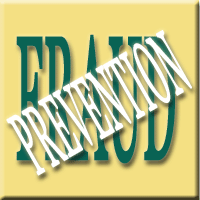
• Home •
Victim΄s Story •
Fraud Prevention •
Project GSO •
Hall of Shame •
LINKS •

Schemes, Scams and Cons
Public Warning
Fraud
Every crime has three elements. There is a victim, a perpetrator and a place.
If you change or remove one of the three then no crime can take place. In the fraud arena this is a daunting if not almost impossible task.
The perpetrator could be a 12 year old who sets up an ebay account to sell non-existent computer games or a seasoned terrorist looking to fund the purchase of guns and bombs with fraud derived funds.
The place can be a local parking lot to a clandestine operation in the middle of Europe or Asia, which makes investigations expensive or impossible due to cross border jurisdictions.
Fraud has 5 elements:
1. Mens Rea - Criminal Intent.
2. Actus Reas - Criminal Action.
3. Carelessness or Innocence on the part of the victim.
4. An active participation by the victim as a result of the carelessness or innocence.
5. The transaction is concealed to prevent detection.
Consumer Fraud Prevention needs to only address the careless or the lack of education and the crime triangle will be broken.
Identity Theft - Tools
There is no crime called "Identity Theft". The term is an umbrella name given to a group of thefts and frauds where:
"Tools, documents and information meant for the exclusive use of one person are used by another, typically for illegal financial gain."
Tools:
Bank Cards
Store Cards
Gas Cards
Car keys
Remote Garage Door Opener
House keys
Key cards
SIN cards
Information:
Address
Phone number
Work hours
Work place
Schedule
Passwords
P.I.N.s
Receipts
Documents:
Driver's License
Birth Certificate
Baptism Certificate
Passport
Lease
Mortgage
Insurance
Registration
Prevention - Methods to Protect Private Information
Don't load purses or wallets with credit cards.
Never leave purses or wallets in cars, even if they're hidden.
Never carry social security cards or birth certificates in purses or wallets.
Don't keep ATM personal identification numbers (PIN) or other passwords in purses or wallets.
Avoid using easily discovered passwords or PIN number/codes, such as birth dates, phone numbers, or addresses.
Keep a list or photocopy of all of your credit accounts and bank accounts in a secure place, such as a safe, lock box, or locked file cabinet.
Keep tax records, canceled checks, and paid bills in a secure place, or shred them before throwing them away.
Be careful when ordering something over the Internet. Make sure the server is secure.
When purchasing items with a credit card, always keep credit card receipts. Never toss them in a wastebasket.
Don't let others see an entered ATM password.
When approaching an ATM be aware of others near the machine.
Don't leave printed receipts behind at bank machines or gas pumps.
Don't speak or press credit card or bank account numbers over a wireless or cordless phone unless it's equipped with encryption technology.
Change passwords and PIN numbers regularly.
Purchasing a home paper shredder.
Methods to Secure Mail
Cut up, shred, or otherwise destroy pre-approved credit offers that you don't intend to accept before putting them in your trash or recycling bin.
When mailing bills, letters, applications, and other papers containing personal information place them in a secure outgoing mailbox.
Don't write personal account numbers on checks or the outside of envelopes you are mailing.
Install locked residential mailboxes.
When ordering new checks, don't have them sent to a home mailbox but pick them up at the bank instead.
Check with the post office if mail delivery suddenly stops.
Don't leave mail accumulating in the mailbox while out of town.
Inexpensive mailbox inserts - boxes that fit inside standard mailboxes - have slots for mail and must be unlocked with a key.
Methods to Check and Secure Accounts
1. Order credit reports from each of the credit bureaus at least once a year to ensure accurate information.
2. Check credit card statements and immediately report unauthorized purchases.
3. Contact the issuer if a new or renewed credit card doesn't arrive.
4. Add a fraud alert to credit files that signals the major credit bureaus - to inform credit givers to call for verification of any credit applications.
5. Read all bills carefully and call creditors to dispute any charge not made or authorized.
6. Equifax currently provides several levels of service that allow consumers choices in receiving information about their credit histories. These options range from being notified of significant changes to credit files to being sent a copy of their current reports and scorings.
7. Ways to Avoid Giving Out Unnecessary Personal Information
o Don't have SINs or driver's license numbers printed or handwritten on checks.
o Only list names and numbers and no addresses in the telephone book white pages.
o Never provide personal information (credit card number, driver's license number, SIN, birth date, mother's maiden name) over the phone unless you've initiated the call and know to whom you are speaking.
o Don't allow sales clerks to copy credit card numbers on checks for additional information or to use credit cards as identification.
o Avoid giving credit card numbers over the phone if in a public place.
o Don't sign up for unfamiliar contests or sweepstakes.
o Never post personal information on an Internet chat room.
o Don't provide information that isn't required.
o Never give anyone online passwords.
Prevention - Other Ways to Protect Personal Information
Ask banks to require personal passwords of anyone accessing accounts.
Delete names and addresses from marketers' lists.
Call one of the credit agencies to remove names from lists sold to companies offering pre-approved credit cards.
Ask stores how they safeguard credit applications. Ensure the applications are treated as secure documents.
Use a credit card instead of a debit card; debit cards don't have maximum liability for fraudulent use.
Sign credit cards in permanent ink as soon as they're obtained.
Don't sign a blank charge slip. Draw a line through all areas for recording charges above the total.
If a supposed government agency is making an offer, find the phone number in the blue pages of the telephone book, and call the agency to make sure it's valid.
Before giving information ask how it will be used. For instance, supermarket scan cards enable special sale prices but the store could be selling purchasing histories.
Use caller ID or an answering machine to screen your calls.
Consumers should talk about privacy concerns with their children and other household members.
Identity Theft Web Sites
Following are some good sources of identity theft information:
- www.governmentservices.gov.ab.ca
- www.cmcweb.ca
- www.consumerinformation.ca
- www.consumer.gov/idtheft/
- www.usdoj.gov/criminal/fraud/idtheft.html
- www.privacyrights.org/ar/id_theft.htm
- www.usdoj.gov/criminal/cybercrime/usamarch2001_3.htm
- www.ftc.gov/bcp/conline/pubs/alerts/hoaxalrt.htm
- www.oag.state.ny.us/press/2001/jul/jul17a_01.html
- www.abanet.org/media/lnn/copwidtheftscript.html
- www.stolen-identity.com
- www.interesting-information.com/identity-theft/identity-theft-prevention.htm
Prevention - It wasn't me! I'm the victim!
When an imposter co-opts your name, your Social Insurance Number (SIN), your credit card number, or some other piece of your personal information for their use - it's a crime.
The signs can be many, but typical indicators that your identity is being used include:
A creditor informs you that an application for credit was received with your name and address, which you did not apply for.
Telephone calls or letters state that you have been approved or denied by a creditor that you never applied to.
You receive credit card statements or other bills in your name, which you did not apply for.
You no longer receive credit card statements or you notice that not all of your mail is delivered.
A collection agency informs you they are collecting for a defaulted account established with your identity and you never opened the account.
Now what?
If you have been a victim of identity theft, the Identity Theft Statement helps you notify financial institutions, credit card issuers and other companies that the identity theft occurred, tell them that you did not create the debt or charges, and give them information they need to begin an investigation. Make as many copies of the Statement as you will need to notify all affected companies.
Start a log of dates, person(s) that you spoke with and exactly what they said.
Contact the fraud departments of each of the two major credit bureaus.
Equifax: (800) 465-7166 and
Trans Union: (866) 525-0262 except
Quebec residents (877) 713-3393
Request that a "Fraud Alert" be placed in your files. At the same time order copies of your credit reports.
Contact the fraud department of creditors for any accounts that have been opened or tampered with fraudulently. This may include credit card companies, phone companies, banks and other lenders.
File a report with your local Police or the Police in the community where the identity theft took place.
Contact PhoneBusters National Call Centre. PhoneBusters is currently central sourcing all pertinent information on Identity Theft to identity trends and patterns, information is also used to assist law enforcement agencies in possible investigations.
Remember: There is no reason to be paranoid; there's just reason to be careful. If someone wants desperately to target you, they can probably get a lot of information about you -- so you just need to minimize the criminal's opportunities to get that information. You can make yourself a harder target and that the best defense. If you are a victim, do not panic, you will not be out any money. The losses will be attributed to the banks and or companies associated with the fraud.
© 2006-2010 by GSO • Contact